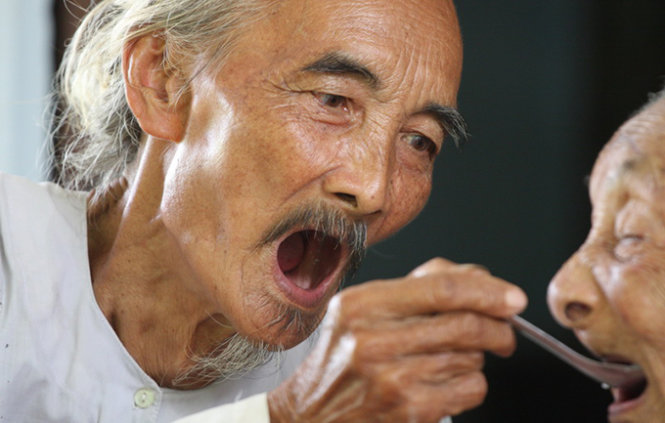Despite statistical evidence of physical and verbal abuse directed at parents, many Vietnamese still resolve to keep the country’s hidebound tradition of honoring the mother and father.
Data from the Department of Family Issues under the Ministry of Culture, Sports and Tourism revealed that 14,017 cases of elderly abuse were reported from 2011 to 2015, accounting for 8.91 percent of the 157,859 cases of domestic violence recorded during the period.
Commenting on the opinion that the general morality of Vietnamese seems to be declining, Dr. Ly Tung Hieu, a lecturer at the Ho Chi Minh City University of Social Sciences and Humanity, said that materialism has seeped into the Vietnamese way of life, turning any filial affection from an honor to a duty.
Associate Professor Doctor Huynh Van Son, vice-rector of the Ho Chi Minh City University of Education, voiced a similar opinion.
“As individualism rises, a lack of filial affection has made its way into the mindsets of young people,” Dr. Son said.
 |
| Children accompany parents at a pagoda during the Vu Lan Festival in Vietnam. Photo: Tuoi Tre |
Keeping familial affection in tune
Despite the growing sentiment of filial detachment, there are many who cling to a tradition of unshakeable love toward familial elders.
“There are serious large-scale problems with social morality, but filial affection still reigns,” said Le Van Thanh, head of the Bureau of Culture and Society, Ho Chi Minh City Institute for Development Studies, in response to stories of ‘bad children.’
“The Vu Lan Festival, for example, helps spread the image of good children,” he added.
The Vu Lan Festival is a Buddhist ceremony held in the seventh month of the lunar year to promote the love of children for their parents.
Thanh’s point is further illustrated by the large proportion of Vietnamese children who still host their aging parents despite the growing availability of nursing homes and elderly care services in Vietnam.
However, he notes that familial love is a two-way street.
“Children in the modern age might be buried in their digital devices and the cyber world, but that doesn’t excuse parents from giving them the much-needed attention they deserve,” he said.
Thanh suggested parents spend more time caring for their children while children focus their efforts on providing for their elders.
 |
| Nguyen Hung (R), 43, feeds his 81-year-old mother, in Da Nang, central Vietnam. Photo: Tuoi Tre |
One good deed deservers another
Echoing Thanh’s opinion, Tran Van Tam, a 67-year-old resident of Go Vap District, Ho Chi Minh City, stresses the importance of education in preserving family bonds.
From his perspective, parents need to take the lead and be a good example, following the Vietnamese proverb, “The next wave follows the path of the first.”
“If we want our children to love us, then we must love our own parents. If we set a good example, our children will follow suit,” Tam said.
The annual ‘Best Elderly’ festival is just one of the ways the local municipal leaders are attempting to celebrate the importance of parental modeling.
“This celebration is significant as it teaches younger generations how to be good children. It also shows that if parents want respect, first they must behave themselves,” commented Chau Minh Ti, a representative from the Ho Chi Minh City Association of the Elderly.
He further explained that, in this day and age, it is out of the question to ask busy children to tend to their parents 24/7, so parents themselves must spark the flame of familial love in a proactive manner.
 |
| Trinh Thi Lan (R), 13, cares for her mentally ill mother in Thanh Hoa Province, Vietnam. Photo: Tuoi Tre |
Is blood thicker than in-laws?
Bui Duc Than, a 61-year-old self-employed carpenter living in Thong Nhat District, Dong Nai Province, helped care for his mother-in-law for years before she passed away last December at the age of 83.
He and his wife took their mother into their home after her health began to decline.
They enjoyed family meals every single day, and Than cleared part of his to ensure ample space for the elderly woman.
During the Tet (Lunar New Year) holiday and the Catholic All Souls’ Day on November 2, the couple took their mother to the cemetery in Dinh Quan District, about 13km from Thong Nhat, to pay respects to their deceased family members.
“My dad never made the smallest complaint. I feel a strong urge to be a good child myself,” Than’s son shared.
The devoted son-in-law best illustrates how parental modeling can instill a profound sense of filial love in children.
Like us on Facebook or follow us on Twitter to get the latest news about Vietnam!



















































